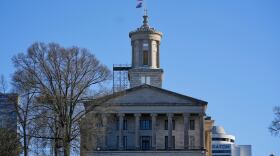The first thing Tennessee’s budget director wants you to know about Tennessee’s current budget surplus is that it’s unusual — like really unusual.
“Normal over-collection is closer to $100 to $200 (million) in a good year,” says David Thurman.
So far, Tennessee has collected about $3.7 billion more than it expected this budget year. The legislature allocated some of the money in the recent session, but the state is still anticipating about $1 billion to be leftover.
Thurman says having a surplus is good thing. It allows the state to make big, one-time investments in things like roads, capital projects and the state’s rainy day fund. He says it also allows for some strategic increases to ongoing expenses, like schools.
“To commit $750 million of recurring revenue in education is big. We’ve never done that before without a tax increase.”
Thurman, says the budget for recurring items increases gradually to adapt to higher revenues. But he says the state is generally conservative about planning spending increases, to avoid coming up short and having to make cuts later.
But on the con side, it takes a while for the state to be allowed to use that money. The $1 billion surplus expected this summer can’t be touched until the legislature assigns it nearly a year from now.
And Kinika Young, senior director for health policy and equity at the Tennessee Justice Center, thinks that kind of money could have been better invested in immediate services for struggling Tennesseans.
“When you consider the people living in poverty, people experiencing homelessness, parents struggling to afford quality child care, and people who can’t get health care, $1 billion surplus sends the message that meeting their needs and addressing these crises are not a priority.”
Young says the state should be spending more on a recurring basis on what she calls “human capital” — things like expanding Medicaid and other social services — especially given how many people are struggling financially right now.
Young also points out that during the pandemic, the state didn’t have to dip into its rainy day fund.
“If it hadn’t been raining in the past three years, then I don’t know if there will ever be rain to justify using that money. So I think we have to strike a balance between being fiscally responsible and saving for the future, and actually meeting the immediate needs that people are struggling with today.”
Tennessee did have to tap into rainy day funds during and after the Great Recession from 2007 to 2009. But legally those funds are supposed to be a last resort. During the pandemic, Tennessee’s revenues soared, so dipping into rainy day money, really wasn’t an option.
Why does this matter?
But why should the state budget surplus matter to everyday people in Tennessee? In short, because a lot of it is taxpayer money — the sales tax you pay on groceries, gas and online purchases. To put it into context, a $1 billion surplus would be enough to give every person in Tennessee almost $150.
Tennesseans’ tax bills will shrink some in the month of August, when there will be a one-month holiday on sales taxes for groceries. Gov. Bill Lee says that’s an effort to help people manage the rising cost of living.
And some analysts say that for the state to have extra cash to fall back on isn’t a bad idea. Mandy Pellegrin is the policy director at the nonpartisan Sycamore Institute and tracks the state’s revenue collections.
“A surplus in a moment like this probably has more pros to it than cons, just given all the uncertainty that’s going on in the economy.”
And with inflation at a historic high, state officials have tended to agree.





